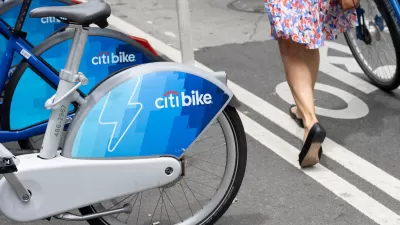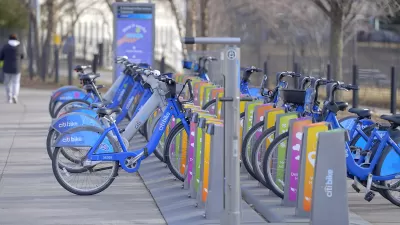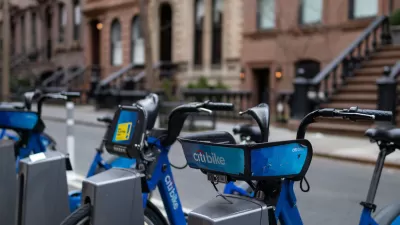Polls show widespread public support for New York City's new bike share program. But as stations begin to appear on city streets, pitched battles are being waged over the control of public spaces.
"Now that the metal stalls and kiosks where bikes will be stationed are turning up in parts of Brooklyn and downtown Manhattan, the theater of operations in the war among cyclists and drivers and pedestrians has expanded and multiplied and bred new factions, even though the bike share program itself has been shown to have widespread support in polling," says Ginia Bellafante.
"On Wednesday night, a litany of grievances were heard at a town-hall meeting in Clinton Hill, in Brooklyn, which had been organized by Councilwoman Letitia James to address concerns about the way in which the bike program was unfolding. The undercurrent was the contest between young and old, between churchgoer and heathen, between the preservationist and the futurist, the realist and the skeptic. The bike stations were usurping parking spots — churches depend on street parking. Older people who are more car-reliant than Bianchi-reliant worried about parking as well; they also worried that bike stations positioned in the wrong places could make it harder to navigate sidewalks and cross the streets."
"The area of disconnect the bike share program has most egregiously exposed is the one between the city’s understanding of community outreach and the way that information is received and processed in any given neighborhood," contends Bellafante.
FULL STORY: The Bikes and the Fury

Planetizen Federal Action Tracker
A weekly monitor of how Trump’s orders and actions are impacting planners and planning in America.

Map: Where Senate Republicans Want to Sell Your Public Lands
For public land advocates, the Senate Republicans’ proposal to sell millions of acres of public land in the West is “the biggest fight of their careers.”

Restaurant Patios Were a Pandemic Win — Why Were They so Hard to Keep?
Social distancing requirements and changes in travel patterns prompted cities to pilot new uses for street and sidewalk space. Then it got complicated.

Maui's Vacation Rental Debate Turns Ugly
Verbal attacks, misinformation campaigns and fistfights plague a high-stakes debate to convert thousands of vacation rentals into long-term housing.

San Francisco Suspends Traffic Calming Amidst Record Deaths
Citing “a challenging fiscal landscape,” the city will cease the program on the heels of 42 traffic deaths, including 24 pedestrians.

California Homeless Arrests, Citations Spike After Ruling
An investigation reveals that anti-homeless actions increased up to 500% after Grants Pass v. Johnson — even in cities claiming no policy change.
Urban Design for Planners 1: Software Tools
This six-course series explores essential urban design concepts using open source software and equips planners with the tools they need to participate fully in the urban design process.
Planning for Universal Design
Learn the tools for implementing Universal Design in planning regulations.
Heyer Gruel & Associates PA
JM Goldson LLC
Custer County Colorado
City of Camden Redevelopment Agency
City of Astoria
Transportation Research & Education Center (TREC) at Portland State University
Camden Redevelopment Agency
City of Claremont
Municipality of Princeton (NJ)





























